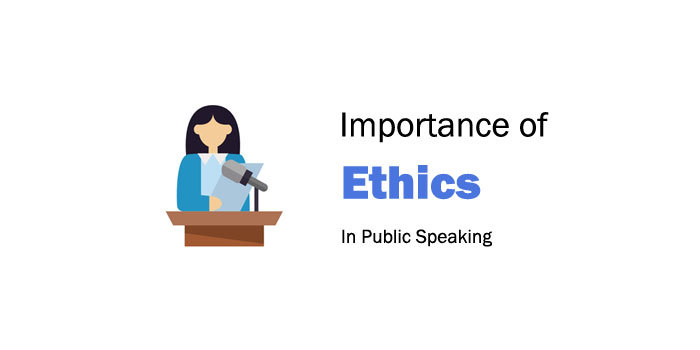Ethics in Public Speaking: 7 Tips to be a More Ethical Speaker
Public speaking has long been one of the most challenging skills to perfect, as it can be difficult for many. Some speakers can more easily gain their audience's interest, while others don’t provide their audience with much value.
While any speech can captivate an audience and provide value and insight, you can provide even more value to your audience by showing respect and being genuine. Therefore, it is crucial to take ethics in public speaking very seriously when engaging with your audience.
If you may still have some doubts about the importance of ethical speaking, I’ve compiled a list based on my experience and research on the ethical aspects of public speaking.
7 Tips for Ethics in Public Speaking
Listed below are seven tips to help you be more of an ethical speaker:

1. Give Your Audience Respect
Everyone deserves respect, and the audience listening to your speech is no exception. Showing respect to your audience is directly correlated to how your message is received. Therefore, you should remain respectful at all times.
Showing your audience respect is one of the most important aspects of public speaking. It is one of the ways that your audience can recognize the impact and legitimacy of your speech. This means not to demean your audience but to treat them as equals. You should remain neutral on social status, gender, and religion and not look down upon them for having different beliefs.
If you would like to liven up the mood during the speech and make a joke, it needs to be made at your expense, instead of the audience.
2. Respect Their Time
Time is one of the most important resources at our disposal, and we can never get it back. Therefore, it is important to be mindful of your audience’s time and ensure they receive value.
It is important not to be drawn out and to keep your speech concise and to the point. This will lead to more audience engagement and allow them to have a more positive experience overall.
Think about the times you were in school, and your class went over the allotted time. Or when you are at work, and your boss wanted you to stay later, remember how you felt? You wouldn’t want your audience to feel that way. It would make them regret attending your speech in the first place.
Keeping the speech concise and to the point will allow you to convey your message to your audience and keep them engaged.

3. Ensure You Come Prepared
Preparation is important because it shows that you truly value your audience and appreciate them for their time by coming and listening to your speech. Therefore, it is important to provide your audience with value.
Coming to the speech prepared allows you to show your audience that you have devoted time and energy to perfecting your speech and value your audience’s time, effort, and money invested.
It is important to perform ample research and ensure facts back up your statements. It is also important to rehearse your speech a few times to easily translate your understanding of the subject professionally to your audience.
Good preparation allows you to ensure your audience is engaged and further understand your audience and the subject.
You might also like: How to Prepare for a Speech
4. Be Factual

It is important not to mislead your audience. Personally, it has become almost second nature for me to fact check my speeches to ensure they are correct. As a speaker, I value my audience and want them to benefit from their time invested.
One of the last things you want your audience to do is find out a particular part of your speech wasn’t 100% true.
References, authoritative resources, and scholarly articles are great resources to cite.
This ensures that you speak factually and ensure that your audience is only receiving accurate, proven information. One aspect of public speaking I always keep in mind is that if you are not sure if a fact is true or proven, it is important not to use it in your speech.
Being factual allows your audience to see you as a credible resource for information and consider you a professional in your field.
5. Speak About Ethical Behaviors
When preparing your speech, it is important to keep your audience's health and safety in mind. I don’t know about you, but I wouldn’t want to listen to a speaker talk about harmful substances, such as drugs.
Drugs, violence, and anything that could pose harm to others is not considered ethical speech material.
As a speaker, I always keep in mind that I am responsible for providing enlightenment and understanding of a variety of ethical topics. In our line of work, talking about any unethical topics lessens your credibility as an ethical, professional, and personable speaker.
6. Be Genuine
When people attend your speech, they want you to be genuine and yourself. I always keep in mind that one rule of thumb is that your audience came to see you. If they wanted to see someone else, they would have.
You should keep your personality, mannerisms, and tone of voice genuine, like talking to a friend.
If you are not yourself, your audience will take notice and not take you seriously, and will not consider you a reputable speaker in your field.
7. Avoid Plagiarism
It is important to keep your content original. If you copy someone else’s speech, the audience will not consider you credible.
For example, whenever I use someone else’s information in a speech, I ensure that it is cited correctly and that the original author is given credit. This will make you a more credible speaker and build trust with your audience.

Conclusion: On Ethics of Public Speaking
If you are concerned about ethics in public speaking, you are already doing something right. I believe I have been able to enlighten you to become the speaker you want to be.
There are many other tips to be ethical in public speaking, but these basics should see you through your public speaking engagement. These tips will help you come one step closer to your public speaking goals!
